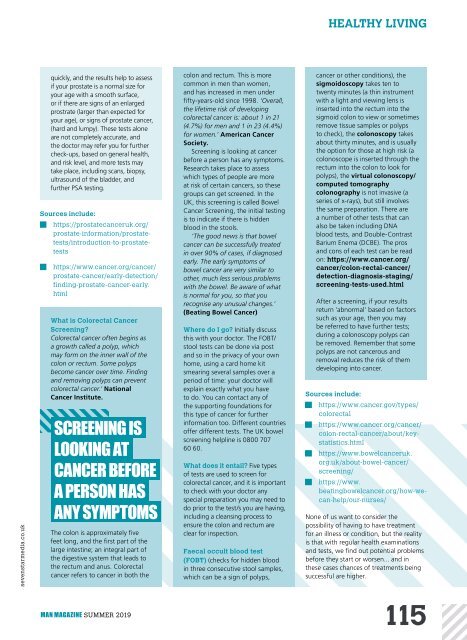You also want an ePaper? Increase the reach of your titles
YUMPU automatically turns print PDFs into web optimized ePapers that Google loves.
HEALTHY LIVING<br />
sevenstarmedia.co.uk<br />
quickly, and the results help to assess<br />
if your prostate is a normal size for<br />
your age with a smooth surface,<br />
or if there are signs of an enlarged<br />
prostrate (larger than expected for<br />
your age), or signs of prostate cancer,<br />
(hard and lumpy). These tests alone<br />
are not completely accurate, and<br />
the doctor may refer you for further<br />
check-ups, based on general health,<br />
and risk level, and more tests may<br />
take place, including scans, biopsy,<br />
ultrasound of the bladder, and<br />
further PSA testing.<br />
Sources include:<br />
https://prostatecanceruk.org/<br />
prostate-information/prostatetests/introduction-to-prostatetests<br />
https://www.cancer.org/cancer/<br />
prostate-cancer/early-detection/<br />
finding-prostate-cancer-early.<br />
html<br />
What is Colorectal Cancer<br />
Screening?<br />
Colorectal cancer often begins as<br />
a growth called a polyp, which<br />
may form on the inner wall of the<br />
colon or rectum. Some polyps<br />
become cancer over time. Finding<br />
and removing polyps can prevent<br />
colorectal cancer.’ National<br />
Cancer Institute.<br />
SCREENING IS<br />
LOOKING AT<br />
CANCER BEFORE<br />
A PERSON HAS<br />
ANY SYMPTOMS<br />
The colon is approximately five<br />
feet long, and the first part of the<br />
large intestine; an integral part of<br />
the digestive system that leads to<br />
the rectum and anus. Colorectal<br />
cancer refers to cancer in both the<br />
colon and rectum. This is more<br />
common in men than women,<br />
and has increased in men under<br />
fifty-years-old since 1998. ‘Overall,<br />
the lifetime risk of developing<br />
colorectal cancer is: about 1 in 21<br />
(4.7%) for men and 1 in 23 (4.4%)<br />
for women.’ American Cancer<br />
Society.<br />
Screening is looking at cancer<br />
before a person has any symptoms.<br />
Research takes place to assess<br />
which types of people are more<br />
at risk of certain cancers, so these<br />
groups can get screened. In the<br />
UK, this screening is called Bowel<br />
Cancer Screening, the initial testing<br />
is to indicate if there is hidden<br />
blood in the stools.<br />
‘The good news is that bowel<br />
cancer can be successfully treated<br />
in over 90% of cases, if diagnosed<br />
early. The early symptoms of<br />
bowel cancer are very similar to<br />
other, much less serious problems<br />
with the bowel. Be aware of what<br />
is normal for you, so that you<br />
recognise any unusual changes.’<br />
(Beating Bowel Cancer)<br />
Where do I go? Initially discuss<br />
this with your doctor. The FOBT/<br />
stool tests can be done via post<br />
and so in the privacy of your own<br />
home, using a card home kit<br />
smearing several samples over a<br />
period of time: your doctor will<br />
explain exactly what you have<br />
to do. You can contact any of<br />
the supporting foundations for<br />
this type of cancer for further<br />
information too. Different countries<br />
offer different tests. The UK bowel<br />
screening helpline is 0800 707<br />
60 60.<br />
What does it entail? Five types<br />
of tests are used to screen for<br />
colorectal cancer, and it is important<br />
to check with your doctor any<br />
special preparation you may need to<br />
do prior to the test/s you are having,<br />
including a cleansing process to<br />
ensure the colon and rectum are<br />
clear for inspection.<br />
Faecal occult blood test<br />
(FOBT) (checks for hidden blood<br />
in three consecutive stool samples,<br />
which can be a sign of polyps,<br />
cancer or other conditions), the<br />
sigmoidoscopy takes ten to<br />
twenty minutes (a thin instrument<br />
with a light and viewing lens is<br />
inserted into the rectum into the<br />
sigmoid colon to view or sometimes<br />
remove tissue samples or polyps<br />
to check), the colonoscopy takes<br />
about thirty minutes, and is usually<br />
the option for those at high risk (a<br />
colonoscope is inserted through the<br />
rectum into the colon to look for<br />
polyps), the virtual colonoscopy/<br />
computed tomography<br />
colonography is not invasive (a<br />
series of x-rays), but still involves<br />
the same preparation. There are<br />
a number of other tests that can<br />
also be taken including DNA<br />
blood tests, and Double-Contrast<br />
Barium Enema (DCBE). The pros<br />
and cons of each test can be read<br />
on: https://www.cancer.org/<br />
cancer/colon-rectal-cancer/<br />
detection-diagnosis-staging/<br />
screening-tests-used.html<br />
After a screening, if your results<br />
return ‘abnormal’ based on factors<br />
such as your age, then you may<br />
be referred to have further tests;<br />
during a colonoscopy polyps can<br />
be removed. Remember that some<br />
polyps are not cancerous and<br />
removal reduces the risk of them<br />
developing into cancer.<br />
Sources include:<br />
https://www.cancer.gov/types/<br />
colorectal<br />
https://www.cancer.org/cancer/<br />
colon-rectal-cancer/about/keystatistics.html<br />
https://www.bowelcanceruk.<br />
org.uk/about-bowel-cancer/<br />
screening/<br />
https://www.<br />
beatingbowelcancer.org/how-wecan-help/our-nurses/<br />
None of us want to consider the<br />
possibility of having to have treatment<br />
for an illness or condition, but the reality<br />
is that with regular health examinations<br />
and tests, we find out potential problems<br />
before they start or worsen... and in<br />
these cases chances of treatments being<br />
successful are higher.<br />
<strong>MAN</strong> MAGAZINE SUMMER <strong>2019</strong><br />
115

















